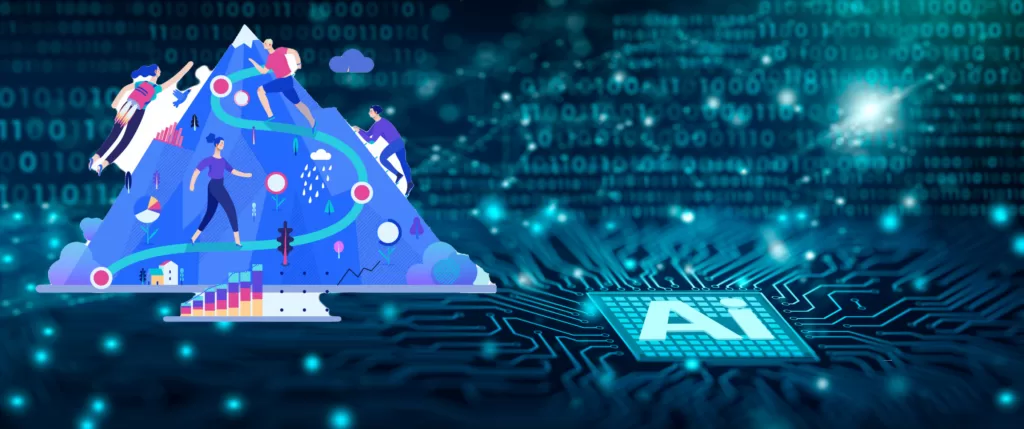Fueling Motivation in the Digital Age: The role of Artificial intelligence in human motivation
In the fast-paced digital age, where technology shapes nearly every aspect of our lives, understanding and harnessing motivation has become increasingly important. Motivation is the driving force behind our actions and its significance in achieving personal and professional goals cannot be overstated.
As the world embraces the power of artificial intelligence (AI), it is critical to explore how this transformative technology can contribute to fueling motivation.

Fueling motivation in the digital age is a complex topic that involves the intersection of artificial intelligence and human psychology. Some fears that automation and Artificial Intelligence (AI) will lead to the job loss and battle to change, and others see it as an opportunity to free up time for more meaningful contributions, focus on complex and creative tasks that machines cannot perform.
Developing a digital mindset is essential for employees to succeed in the digital age and it requires a change in thinking that cuddle the spirit and constant transition that comes with digital change. The personalization of digital environment is all over due to the rise of AI-based algorithms and platforms and it has the potential to improve motivation and well-being.
This article aims to shed light on the role of AI in motivating individuals in various domains and provides insights into the potential benefits and considerations associated with its implementation. It aims to give you a better understanding of the ways AI can inspire and drive individuals and also shares the advantages and important things to consider when using AI for motivation.
There are 5 best proven ways to fuel your motivation in the digital age:
-
Enhancing Personal Productivity:
AI-powered personal productivity tools have gained massive popularity in recent years. These tools utilize AI algorithms to analyze user behavior, provide personalized recommendations and streamline tasks. By automating routine and unexciting activities, AI allows individuals to focus on more challenging and fulfilling tasks, ultimately boosting their motivation.
In addition, AI-driven virtual assistants can offer timely reminders, set goals, provide feedback, helping individuals to stay on track and maintain their motivation. The incorporation of AI in personal productivity tools can significantly enhance efficiency and effectiveness, empowering individuals to carry out more and fueling their motivation:
- AI-powered personal productivity tools streamline tasks and automate routine activities.
- Personalized recommendations and feedback from AI algorithms boost motivation.
- Ai-driven virtual assistants set goals, provide reminders and offer support.
-
Gamification and Motivation:
Gamification, the integration of game elements in non-gaming contexts has come up as a powerful tool for motivation. AI plays an essential role in gamification by creating personalized and adaptive gaming experiences.
By engaging AI algorithms, games can adjust difficulty levels, provide customized challenges, offer real-time feedback and creating a motivational environment. AI-powered analytics can track user progress, identify strengths and weaknesses, provide data-driven insights for continuous improvements, fueling motivation in both individual and collective gaming scenarios.
Gamification powered by AI has found application in various domains, such as fitness, education and employee engagement, offering immersive and rewarding experiences that drive motivation and enhance performance. Here are some benefits and drawbacks of gamification and motivation with AI:
Benefits of Gamification and Motivation:
- Gamification creates a more interactive and dynamic learning experience, which can capture students’ attention and motivate them to participate more actively in the learning process.
- Gamification can improve student motivation by incorporating game elements such as points, badges and leaderboard, creating a sense of competition and achievement that can motivate students to strive for success.
- AI can create a personalized experience that adapts to each user’s needs by analyzing user behavior and preferences.
- AI can automate tasks and reduce costs.
Drawbacks of Gamification and Motivation:
- Gamification can be a potential distraction for students, as they may become more focused on the game than on the learning material.
- The positive effect of gamification may be short-lived and it may not have a significant impact on students, leading to a decrease in natural motivation.
- One of the main drawbacks of gamification is that it can create an over-emphasis on rewards. Students may become more focused on earning points, badges and other rewards than on learning the material.
-
Personalized Learning and Skill Development:
AI has revolutionized the field of education and skill development by offering personalized learning experiences. Flexible learning platforms powered by AI algorithms can dynamically adjust content, pace and difficulty level based on an individual’s abilities and learning style. This kind of personalized approach maximize engagement, minimizes frustration and increase motivation.
AI-powered recommendation systems can suggest relevant courses, resources and learning pathways, allowing individuals to pursue their interests and goals with enthusiasm. By mending the learning experience to individual needs and preferences, AI-driven personalized learning creates a environment conductive to motivation, leading to improved knowledge acquisition and skill development.
-
AI-Driven Coaching and Mentoring:
In general, coaching and mentoring play a vital role in personal and professional growth. Artificial intelligence has the potential to transform these relationships by providing AI-driven coaching and mentoring.
AI-powered chatbots and virtual coaches can offer personalized guidance, support and motivation to individuals who are seeking professional or personal development. AI-driven mentors can leverage vast amounts of data to offer insights, constructive feedback, creating a nurturing and motivational environment.
The anytime, anywhere availability of AI-driven coaching makes it a valuable resource for individuals navigating various challenges and striving for success. AI-driven coaching and mentoring have the potential to standardize access to guidance and motivation, enabling individuals from diverse backgrounds to benefit from expert and support.

-
Ethical Considerations and Human Connection:
As organizations in favor of artificial intelligence (AI) to drive employee motivation, it is crucial to address ethical considerations and preserve human connection. AI offers immense potential in enhancing motivation and performance, it is essential to navigate these advancements responsibly, ensuring fairness, transparency and the protection of human values.
Section below explores the ethical considerations associated with AI in employee motivation and spotlight the importance of maintaining human connections within the digital landscape.
Fairness and Bias:
- AI algorithms must be designed to avoid biased decision-making and ensure fairness to motivate employees.
- Careful attention should be given to training data, as biased or incomplete datasets can perpetuate inequalities in motivation and performance assessments.
- Regular auditing and monitoring of AI systems are necessary to identify and cure potential biases that may arise.
Transparency and Analyzable:
- Employees should have visibility into how AI systems are used to motivate and rate their performance.
- Transparent communication about the role of AI and the factor’s influencing motivation is essential to maintain trust and avoid misunderstandings.
- Answerable AI models should be developed, enabling employees to understand how decision about their motivation and performance are made.
Data Privacy and Security:
- Organizations must prioritize in protecting employee’s personal data and ensuring compliance with privacy regulations.
- AI systems must be designed with robust security measures to safeguard sensitive employee information from unauthorized access of breaches.
- Transparent data usage policies and clear consent mechanisms should be implemented to maintain employee trust in AI-driven motivation systems.
Human Connection and Emotional Intelligence:
- AI can amplify motivation; it cannot replace the significance of human connection and emotional support.
- Organizations should strike a balance by incorporating AI while encouraging meaningful interactions between employees and managers.
- Encouraging regular feedback, open communication and humane leadership can reinforce the human connection and emotional aspect of motivation.
Continuous Evaluation and Improvement:
- Regular evaluation of AI systems is crucial to ensure they align with ethical standards and desired outcomes.
- Gathering feedback from employees regarding their experiences with AI- driven motivation can help identify areas for improvement and address concerns.
- Organization should remain adaptable and responsive, making necessary adjustments to AI systems to reduce potential ethical risks and increase human connection.
What is the role of Artificial Intelligence (AI) in human motivation?
AI can be used to fuel human motivation in various ways, such as by providing personalized recommendations, feedback and rewards. AI can analyze data on user behavior and preferences to provide customized recommendations and feedback that can help individuals achieve their goals. AI can also provide rewards and incentives to motivate individuals to continue working towards their goals.
What are the goals of Artificial Intelligence (AI)?
The goals of AI include computer-enhanced learning, analyzing and perception. AI is continuously evolving to benefit in many different industries. Machines are wired using a cross-disciplinary approach, based on the principal that human intelligence can be defined in a way that a machine can easily mimic it and execute tasks from the simplest to those that are even more complex.
What are the types of AI?
There are different types of AI, including reactive machines, limited memory, theory of mind and self-aware AI. Reactive machines are the simplest type of AI, which can only react to the current situation based on pre-programmed rules. Limited memory: AI can use past experiences to inform future decisions. Theory of mind AI can understand the emotions and thoughts of others. Self-aware is the most advanced type of AI, which can understand its own existence and emotion.
The rise of Artificial Intelligence (AI) in the digital age presents significant opportunities for enhancing human motivation. With personalized recommendations and feedback, AI can tailor experiences to align with individual goals, promoting engagement and satisfaction.
The incorporation of gamification elements, driven by AI can transform tasks into stimulating challenges, cultivating a sense of accomplishment and immediate fulfillment. In addition, AI can act as virtual coaches and mentors, providing personalized guidance and support to individuals on their journeys toward success.
“Fueling Motivation in the Digital Age” serves as a light of inspiration and a guiding light in our fast-paced, technologically driven world. By analyzing behavioral patterns and offering useful insights, AI can reproduce the mentorship experiences of accomplished individuals, inspiring motivation and personal growth.
AI-driven platforms can facilitate social support and connection by creating communities that foster a sense of belonging and accountability.
With the intelligent chat and voice assistants, AI can provide humane interactions, encouragement and creating a supportive environment that boost motivation. Overall, AI integration into our lives has the potential to revolutionize the way we approach motivation, offering innovative solutions to fuel our drive and inspire us to achieve our aspirations in the digital age.
3 thoughts on “Fueling motivation in the digital age”